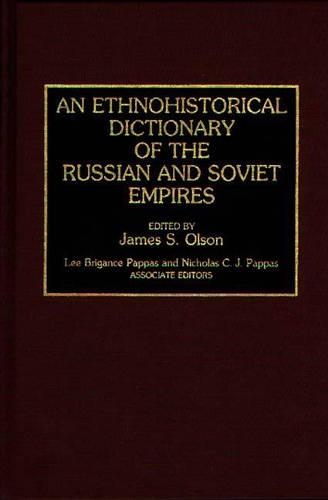
An Ethnohistorical Dictionary of the Russian and Soviet Empires
(Hardback)
Publishing Details
An Ethnohistorical Dictionary of the Russian and Soviet Empires
Bloomsbury Publishing PLC
Greenwood Press
21st March 1994
United States
Classifications
Tertiary Education
Non Fiction
European history
Reference works
305.800947
Physical Properties
Hardback
848
Description
In 1991, the centrifugal forces of ethnic nationalism destroyed the Soviet Union. Religious and ethnic issues will be the defining principles of political life in East Europe, Transcaucasia and Central Asia for the next decade. Yet when most Americans and Europeans read, for instance, of the Ossetians and Ingush, they have no idea who these peoples are or why they are fighting. This text aims to provide a ready reference for students, researchers and librarians who are trying to sort out the political and social struggles in that part of the world. Focusing on ethnolinguistic groups rather than peoples with purely religious orientations, Olson provides entries on over 450 ethnic groups, with appropriate cross-references. Each entry concludes with references, and the volume includes a selected bibliography of English-language titles. The volume also includes a chronology, several appendices providing statistical information and an appendix essay on Islam in Russia and the Soviet Union.
Reviews
.,."a highly useful source for overviews of the various ethnic groupings and identifying English-language sources dealing with the issue. Recommended for academic libraries supporting Russian Studies programs."-Choice
...a highly useful source for overviews of the various ethnic groupings and identifying English-language sources dealing with the issue. Recommended for academic libraries supporting Russian Studies programs.-Choice
A well written dictionary that all collections supporting research on Russia or the Soviet Union will want to purchase.- Reference Book Review
When one reads of the dislocations from their land, armed conflict and conquest, and the systemic oppression that some peoples have endured, it comes as no surprise that in the power vacuum caused by the collapse of the Soviet Union, ancient rivalries have surfaced and threaten to fracture further an already fractured empire. As those conflicts attract more and more attention in the West, this dictionary will become more important as a sound, accessible source of information about the groups, their grudges, and their aspirations.-Wilson Library Bulletin
..."a highly useful source for overviews of the various ethnic groupings and identifying English-language sources dealing with the issue. Recommended for academic libraries supporting Russian Studies programs."-Choice
"A well written dictionary that all collections supporting research on Russia or the Soviet Union will want to purchase."- Reference Book Review
"When one reads of the dislocations from their land, armed conflict and conquest, and the systemic oppression that some peoples have endured, it comes as no surprise that in the power vacuum caused by the collapse of the Soviet Union, ancient rivalries have surfaced and threaten to fracture further an already fractured empire. As those conflicts attract more and more attention in the West, this dictionary will become more important as a sound, accessible source of information about the groups, their grudges, and their aspirations."-Wilson Library Bulletin
Author Bio
JAMES S. OLSON is Professor of History at Sam Houston State University. He is the author of many books, including The Indians of Central and South America: An Ethnohistorical Dictionary (Greenwood, 1991) and Dictionary of United States Economic History (Greenwood, 1992).
